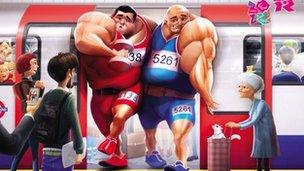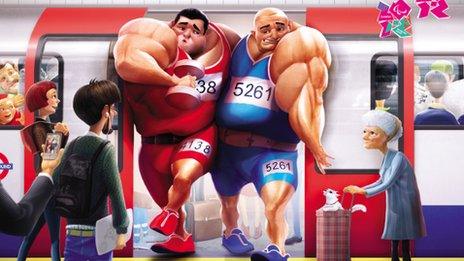Managing the crowds: iPads, social media and Tube wifi
- Published
- comments

Posters warning people about busy roads and trains during the Games were put up
I was in the union-jacked crowd just outside a busy Tube station and there were problems with the Central Line.
The throng wasn't what I've heard London Underground (LU) staffers call a "Canary Wharf crowd" of late, disgruntled commuters.
These were joyous, happy, upbeat spectators and all they wanted to know was how to get to the Olympic Park now there were delays.
I noticed a Games volunteer tapping on his iPad. He then directed the crowds onto one of the other lines.
The other volunteers followed his lead and started doing the same.
Technology had solved a problem.
Due to the wifi on the Tube and the iPad the volunteer had up-to-date information and could "reroute" the commuters.
Web and social media
Transport for London (TfL), the Department for Transport and some (although not all) of the train operating companies were late to social media.
But for the Games, the transport authorities embraced Twitter and the web as part of the "Get Ahead of the Games" campaign.
The campaign budget, funded by the Olympic Delivery Authority (ODA), was £8.8 million. It ran for nine months.
They used the @GAOTG Twitter feed, external and heavily promoted the website, external through traditional media.
The reason being they had very specific messages to get across about specific stations.
So if you went to the website you could see advice about individual stations at certain times and see what the worse case scenario could be if people did not change their travel habits.
There were also daily bulletins on email.
Taking a leaf in part from the Vancouver Winter Olympics, the idea was to try and get commuters to change their travel habits to make room for spectators.
Over a year ago the message was: "Avoid London." That did not go down well with business.
Last year they refined the message to: "Some parts of the network will be very busy so please plan your journey."
During week one of the Olympics the message altered again to: "Plan your journey but enjoy all London has to offer."
Balancing the messages was no doubt extremely difficult.
The tough question to answer is how many regular commuters and spectators took note of these specific tailored messages at specific stations.
TfL reported its busiest ever days on the Tube but it didn't seem super-busy as the crowds were spread out over the day.
Did commuters slightly alter their habits? Certainly the commuters we followed over the weeks did just that.
Many others will have just avoided central London altogether. Was there information overload?
Either way, the authorities attempted to get across complex changing travel messages in real time using social media and the web.
If you wanted very specific travel advice you could find it. That's a first certainly for any Games - if not for any city-wide sporting event - and you'd think you would see more of this technique.
There are some legacies from this crowd management. I'm told that the iPads are going to be kept by LU staff.
Tfl says: "We will be talking to our station staff and travel ambassadors after the Games to determine where these devices can be deployed for greatest benefit.
"Travel Ambassadors have found the iPads to be an invaluable tool for providing instant information on the frontline to support the travelling public."
I'm also told the Travel Ambassadors themselves will reappear at other large events as they were a big success.
Free wifi
The Tube wifi access stops will be free very soon, although the TfL travel page will remain free.
Wifi was very popular as Virgin Media claims 443,000 people used it during the Games.
There are now bound to be calls to make the wifi access totally free all of the time - so far those suggestions have fallen on deaf ears at TfL.
Undeniably transport was a big success for the actual Games with very few problems.
Let me know what you think.
Can social media and the web help deliver specific messages? Did you use it? Or was there information overload and did it all scare you away?
- Published23 April 2012
